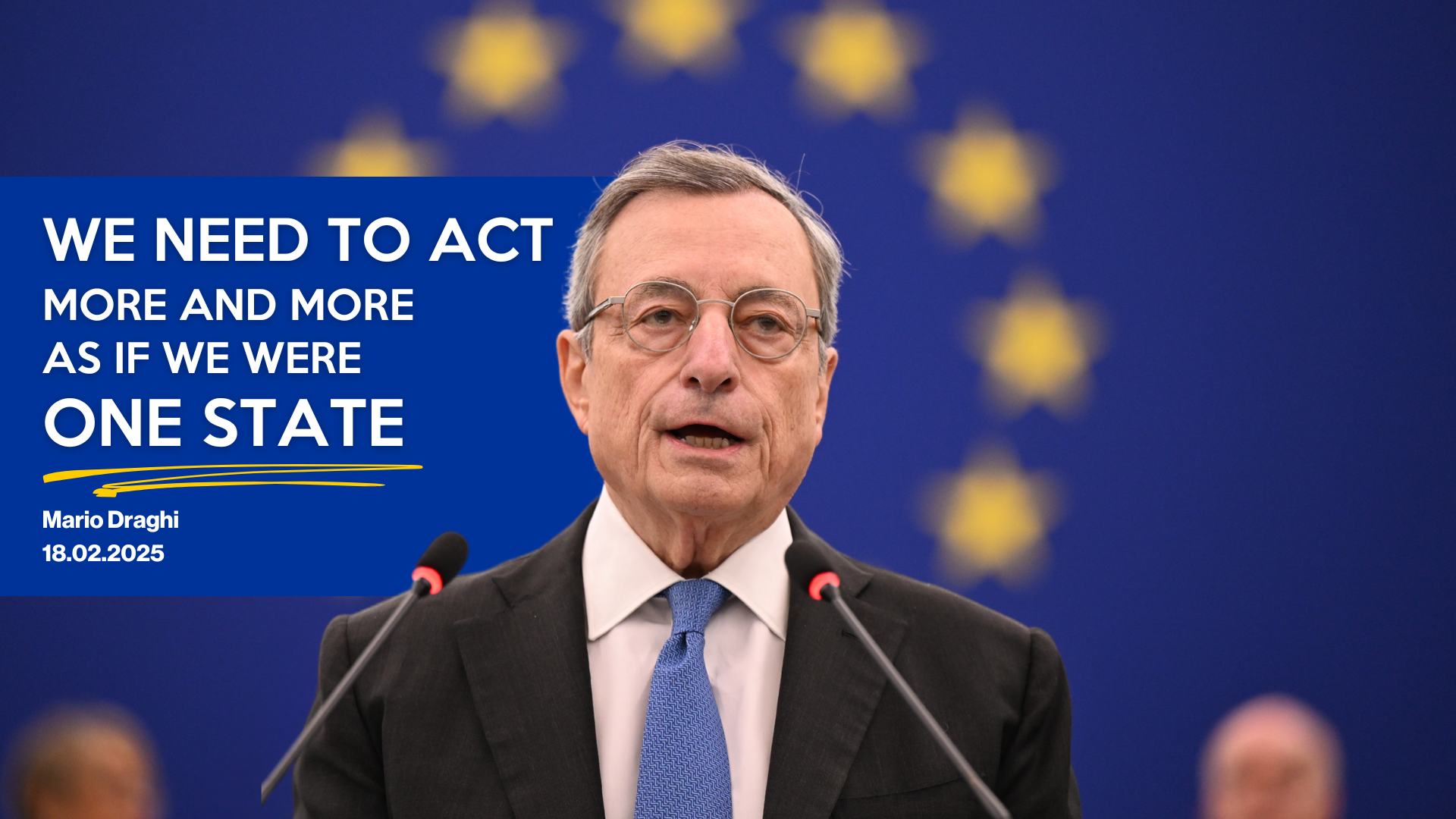LAST EUROPEAN LETTER
N. 84 February 2025 | Make Europe truly great
The long season of illusions is over. The illusion that Europe could indefinitely rely on American protection within the framework of NATO. The illusion that globalization would guarantee peace and stability through trade liberalization and economic interdependence. The illusion that the democratic model was destined to prevail everywhere, driven by open markets and the spread of new technologies.
Two events have forced Europeans—and the world—to open their eyes: Russia’s invasion of Ukraine and Donald Trump’s re-election as President of the United States. Though different in nature, both events have definitively marked the end of the post-World War II international order, which was based on controlling the use of force, establishing multilateral organizations, and fostering ever-stronger economic interdependence.
On one hand, Russia has openly returned to power politics: Ukraine was invaded because it fell within Russia’s sphere of influence and was thus considered its rightful “property,” despite the wishes of its people to move closer to Europe. This aggression was made possible with the support of allied autocracies—particularly China, Iran, and North Korea—which provided Russia with significant resources, both material and human, to sustain its military campaign and withstand Western sanctions. These governments’ goal is clear: to set a “precedent” that legitimizes their own imperialist and revisionist ambitions, paving the way for future military interventions in Asia at the expense of their weaker neighbors.

On the other hand, Trump’s America, effectively abandoning its leadership of the free world, has chosen to radically shift its foreign policy: it will no longer seek common solutions within global forums but will instead rely solely on economic and military power dynamics. The U.S. withdrawal from the Paris Agreements, the World Health Organization, and the UN Human Rights Council marks the end of America’s bipartisan commitment to multilateralism and the beginning of a nationalist course centered on imposing bilateral “agreements” on individual countries—whether allies or rivals. But there’s more: Trump’s claims over the Panama Canal, Canada, and Greenland eerily echo Putin’s claims over Ukraine and former Soviet territories, as well as China’s stance on Taiwan, effectively justifying them. This is the return of power politics, where the strong dictate terms, and the weak endure.
For Europe, this is a nightmare come true. Since the 1990s, the EU has built an economic and institutional model based on entirely different geopolitical assumptions: stable international relations, open markets, the dissemination of its regulatory standards, dialogue and cooperation among great powers, and the strengthening of international organizations. Within this “end of history” framework, the Union could thrive by reducing military spending, enriching itself through exports to China and the U.S., and even cultivating energy dependence on Russia, with the hope of “taming” its dangerous neighbor through economic interdependence. For the same reasons, strengthening political integration by transferring powers and resources to the EU was deemed unnecessary, justifying member states’ desire to maintain their sovereignty in key areas such as defense, foreign policy, and taxation.
This model—embodied above all by Germany under Schröder and Merkel—has now collapsed. Fragile and disoriented, Europe finds itself exposed to severe threats on multiple fronts.

The first is security: Russia is now engaged in an aggressive policy to reclaim the territories it lost with the Soviet Union’s collapse. Its shift to a wartime economy, increasingly brutal repression of dissent, and strengthened military partnerships with Iran and North Korea suggest that the Kremlin is pursuing a neo-imperial strategy through force. Meanwhile, three years into the invasion of Ukraine, the Trump administration is pushing for a direct deal with Putin, excluding both Kyiv and the EU. This would, in effect, allow Russia to keep the territory it has already seized in exchange for vague promises of no further expansion. This is nothing less than a policy of “appeasement,” which will do nothing to deter Putin’s ambitions beyond Ukraine—toward Moldova, Georgia, and, eventually, the Baltic states.
The second front is economic: Europe’s economy is in undeniable decline due to its political fragmentation and the tendency of member states to prioritize national interests, even when implementing common policies. Adding to this—often as a consequence of the lack of a centralized European government—are bureaucratic rigidity, the failure to complete the single market, and sluggish decision-making on strategic issues. While the U.S. and China make massive investments in digitalization, artificial intelligence, and industrial production, Europe struggles to keep up—lacking joint investment capacity, constrained by strict budgetary rules, hampered by a fragmented capital market, suffering from insufficient technological innovation, and dependent on foreign energy and strategic raw materials. Without a shift in direction, the ongoing erosion of Europe’s industrial and technological base will have a devastating ripple effect on employment, prosperity, and social cohesion—upon which the resilience of its democratic fabric depends.
The final front, perhaps the most decisive, is political: the rise of anti-European and extremist forces in public opinion and institutions. These parties, fueled by anti-immigration and security-driven rhetoric, have garnered between 20% and 35% of voter intentions, increasingly influencing the political debate. Some of these movements are already in power, others are poised to be, and now they have found a new leader in Elon Musk—the world’s richest man, an advisor to President Trump, head of the White House’s efficiency department, and an opinion manipulator through his personal social media platform, “X.” Elon Musk, after openly supporting far-right parties like Alternative für Deutschland in Germany, has launched the slogan “MAKE EUROPE GREAT AGAIN,” rallying nationalist and extremist forces that oppose European integration.
Musk’s goal is clear: to use media and financial backing to support radical political movements that, once in power, would dismantle the Union and restore the old Europe of competing nation-states. Even more shocking, the U.S. Vice President, J.D. Vance, directly attacked Europe at the Munich Security Conference—not naming Russia or China as enemies, but rather the EU’s regulations against fake news and hate speech, which he claimed amounted to “unacceptable censorship.” If that weren’t enough, Vance openly urged European politicians to collaborate with far-right forces, which mainstream parties have so far kept at arm’s length.

Faced with these unprecedented threats and attacks, solutions fortunately exist. They have already been outlined in recent reports: the Letta Report on completing the internal market, the Draghi Report on competitiveness, and the Niinistö Report on security. The message is clear: the EU must change radically. First, it must implement policies and initiatives to finance and develop a European defense industry, complete the single capital market, promote strategic investments for ecological and digital transitions, and strengthen military support for Ukraine. At the same time, these urgent measures must be accompanied by an EU reform process addressing two crucial priorities: establishing fiscal autonomy for the Union and enhancing its decision-making capacity in foreign and defense policy by eliminating individual governments’ veto power. The European Parliament already proposed such reforms in November 2023; it is now up to the European Commission to push for them and compel the European Council to proceed with Treaty revisions.
The real problem, then, is not a lack of solutions, but a lack of political will. If these multiple crises are not used as an opportunity to strengthen political integration, there is a real risk that the EU will fracture—either through member states succumbing to Trump’s influence and breaking ranks, or through a “pragmatic” approach that would mean passively accepting all White House demands on gas and arms purchases, the dismantling of EU regulatory standards, and even the de facto American control of Greenland.
In conclusion, to make Europe great, we must not look back to the small nations of the past. Nationalism has never been a source of true greatness; on the contrary, its extreme consequences have brought economic, political, and moral ruin to Europe. If we truly seek greatness, we must build it in the future: only a politically united Europe can survive and thrive in the new geopolitical landscape, achieving the sovereignty that small nation-states can only delude themselves into thinking they still possess.
